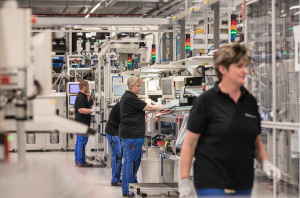
Daimler said it is consistently pursuing its electric offensive and is creating the necessary conditions for the local production of electric vehicles with the construction of a battery factory in China. The new factory is a project of Beijing Benz Automotive Co., Ltd. (BBAC), the Sino-German production joint venture between Daimler and BAIC Motor.
“Building another premium eBattery factory is the next step in the implementation of our electric strategy. Thus, we have the first foreign location in our global battery production network. The local production of batteries is crucial in order to meet the demand for electric vehicles flexibly and efficiently,” says Markus Schäfer, Member of the Divisional Board of Mercedes-Benz Cars, Production and Supply Chain.
Daimler and BAIC said they intend to jointly invest a total of five billion RMB (about 655 million euros) in the production of Battery Electric Vehicles (BEVs) under the Mercedes-Benz brand and in battery localisation at the site. This includes a three-digit million investment (Euro) for the battery production by the joint venture. Local production of battery-powered vehicles is scheduled to start by 2020.
“We are investing in the world’s largest market for Battery Electric Vehicles,” says Hubertus Troska, Member of the Board of Management of Daimler AG, responsible for Greater China. “By 2025, the Chinese market will have a substantial share in sales of Mercedes-Benz electric vehicles. Therefore, local production will be key to the success of our EV portfolio, and crucial to flexibly serving local demand for electric vehicles.”
“By confirming our joint commitment to the development of electric drive in China, and undertaking preparations to produce BEVs at BBAC, we are giving full play to the respective strengths of both sides. Together, we are laying the groundwork for our joint venture facility BBAC to become a future BEV production hub in China,” says Xu Heyi, Chairman of the BAIC Group.
The battery factory will be part of the global battery production network of Mercedes-Benz Cars, in which Daimler invests a total amount of around one billion euros. The network already includes the site in Kamenz, Saxony, existing since 2010, at which a second battery factory is currently built with an investment of around 500 million euros according to latest standards.
With the experiences of the current battery production, employees as multiplicators from Kamenz will support the construction of the new battery factory in Beijing thereby supporting the expansion of the production network.
The battery production plant in Beijing will combine newest industry standards and latest production facilities with industry 4.0 technologies.
The cells for the new plant’s batteries will be from China.
Electric Offensive at Mercedes-Benz Cars
Globally, more than ten new Mercedes-Benz electric passenger cars are scheduled to be launched by 2022. Ten billion euros will be invested in the expansion of the electric fleet over the next years, and the new electric vehicles will be produced within the global, highly flexible and efficient Mercedes-Benz Cars production network, with plants on four continents. Overall, Daimler is investing around one billion euros in the global production of batteries, estimating that by 2025 electric vehicles will account for between 15 and 25 percent of the total unit sales of Mercedes-Benz.
Beijing Benz Automotive Co., Ltd.
Beijing Benz Automotive Co., Ltd., a joint venture between Daimler and its Chinese partner BAIC Motor, is producing Mercedes-Benz cars since 2005 and engines since 2013. In 2016, over two-third of Mercedes-Benz’s total sales in China were produced locally. Due to the considerable success of the locally produced E-Class, C-Class, GLA and GLC vehicles, BBAC’s total local production since 2005 output passed the 1,000,000-unit mark last year. The production of the new generation of the compact SUV GLA started in May this year.
In terms of land size, BBAC is the largest Mercedes-Benz passenger car production hub worldwide. The Mercedes-Benz 4- and 6-cylinder engines manufactured by BBAC are mounted in vehicles produced by BBAC, as well as in vans from Fujian Benz Automotive Co. Ltd. (FBAC), another local Daimler Joint Venture.
In 2016, Daimler and BAIC signed a strategic framework agreement regarding the mutual investment of four billion RMB (more than 500 million euros) in the expansion of the engine plant in Beijing.
 ..:: AUTO REPORT AFRICA ::..
..:: AUTO REPORT AFRICA ::..




